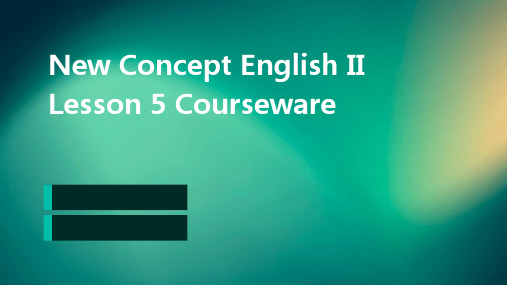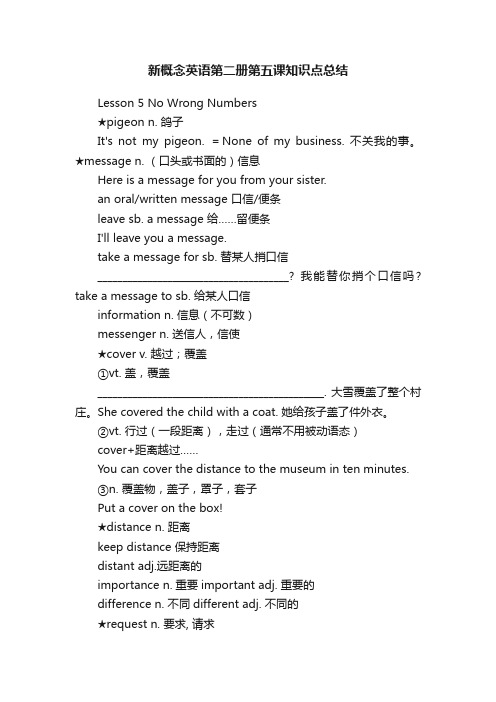新概念英语第二册第五课最全讲义
(完整版)新概念英语第二册lesson5知识点

鸽子It's not my pigeon. =None of my business. 不关我的事。
★message n. (口头或书面的)信息Here is a message for you from your sister.an oral/written message 口信/便条leave sb. a message 给……留便条I'll leave you a message.take a message for sb. 替某人捎口信Can I take a message for you? 我能替你捎个口信吗?Can you take a message for me? 你能替我捎个口信吗?take a message to sb. 给某人口信打电话 :Hello!--‡May I have a word with Tom ?/May I speak with/to Tom? --‡Can you take a message for me?information n. 信息(不可数)messenger n. 送信人,信使★cover v. 越过;覆盖① vt. 盖,覆盖Snow covered the whole village.She covered the child with a coat. 她给孩子盖了件外衣。
② vt. 行过(一段距离),走过(通常不用被动语态)cover+距离越过……You can cover the distance to the museum in ten minutes.③ n. 覆盖物,盖子,罩子,套子Put a cover on the box!★distance n. 距离keep distance 保持距离distant adj.远距离的Can I share this table?Can I join you?importance n. 重要 important adj. 重要的difference n. 不同 different adj. 不同的★request n. 要求, 请求① n.request for 对……有请求, 有需求I have a request for the cake.He granted my request for more time. 他同意了我延长时间的请求。
新概念英语二第5课课件

Course outline
Unit 4
Reading and comprehension, including reading passages and exercises to improve students' reading comprehension skills.
Unit 6
Writing practice, including writing assignments and feedback on students' writing to improve their writing skills.
expansion
01 Course Introduction
Course objectives
Language knowledge
To enhance students' understanding of English grammar and vocabulary through interactive and engaging activities.
Additional
05 information and expansion
Related video materials
Video 1
"Introduction to the lesson"
Video 2
"In-depth analysis of the lesCourse Summary and Review
Key review of this lesson
01
Grammar
Present perfect continuous tense
02
03
新概念英语第二册第5课课件

New words and expressions: pigeon n. 鸽子 Message n.信息
cover ['kʌvə] v. 越过 distance n. 距离 distant adj. 遥远的;有距离的 Syn. remote, faraway request n. 要求;请求 vt. 要求,请求 request for 要求;对…有请求 make a request 请求 Eg. Could I request a window seat?
Unit 5
No wrong numbers
By Estelle
First listen and then answer the question. Why does no wrong numbers mean?
Pigeons are carrying the messages, so there are no mistakes.
spare part 备件 spare [spεə] vt. 节约,吝惜;饶恕;分出,分让 vi. 饶恕,宽恕;节约 adj. 多余的;瘦的;少量的 n. 剩余;备用零件 spare oneself 偷懒 spare time n. 消遣时间 in his spare time 在他闲暇的时候 spare change 零钱 spare money 余款 spare tyre 备用轮胎
Homework: 复习本节课所讲的知识点; 背诵课文; 背诵单词; 完成练习册上对应的练习题。
ቤተ መጻሕፍቲ ባይዱ
最新新概念英语第二册第5课PPT课件

★spare adj. 备用的
① vt. 抽出(时间等),让给 Have you got five minutes to spare? 能占用你五分钟时间吗?
I cannot spare the time. = I have no time to spare. 我没时间 ② vt. 饶恕,赦免 ‘Spare me!’begged the prisoner. “饶了我吧。”那个犯人乞求说。
【New words and expressions】
★pigeon n. 鸽子 It's not my pigeon. =None of my business. 不关我的事。
★message n. (口头或书面的)信息
Here is a message for you from your sister. 这有你姐姐给你的便条。
Up to now, he has not been very hardworking.
a great many(+可数名词复数) 许多…… a great many可以做形容词短语: A great many trees were destroyed in the
storm. 也可作代词短语:
He has read a great many of the books in this room. a great number of(+可数名词复数) 许多…… urgent adj. 紧急的 something urgent 紧急的事情
2、Pinhurst is only five miles from Silbury, but Mr. Scott cannot get a telephone for his new garage, so he has just bought twelve pigeons.
新概念英语第二册第五课最全讲义

Lesson 5 N o No wrong numbers 无错号之虞【New words and expressions 】生词和短语(7)pigeon n. 鸽子鸽子 message n. 信息信息cover v. 越过越过 distance n. 距离距离 request n. 要求,请求要求,请求 spare part 备件备件service n. 业务,服务业务,服务★pigeon n.鸽子鸽子鸽子 It's not my pigeon.=None of my business.不关我的事。
不关我的事。
★message n. (口头或书面的)信息(口头或书面的)信息Here is a message for you from your sister. an oral ['or ['or əl]口头的,口述的/written message 口信/便条便条leave sb. a message 给……留便条留便条 I'll leave you a message. take a message for sb. 替某人捎口信替某人捎口信Can I take a message for you? 我能替你捎个口信吗? Can you take a message for me? 你能替我捎个口信吗? take a message to sb. 给某人口信给某人口信打电话:Hello!-- May I have a word with Tom ?/May I speak with/to Tom?-- Can you take a message for me?information information [, [,ɪnf ɚ'me ʃən] n.信息(不可数)信息(不可数)信息(不可数) messenger n.送信人,信使, 邮递员邮递员★cover v. 越过;覆盖越过;覆盖① vt. 盖,覆盖盖,覆盖Snow covered the whole village. She covered the child with a coat. 她给孩子盖了件外衣。
新概念英语第二册第五课知识点总结

新概念英语第二册第五课知识点总结Lesson 5 No Wrong Numbers★pigeon n. 鸽子It's not my pigeon. =None of my business. 不关我的事。
★message n. (口头或书面的)信息Here is a message for you from your sister.an oral/written message 口信/便条leave sb. a message 给……留便条I'll leave you a message.take a message for sb. 替某人捎口信______________________________________? 我能替你捎个口信吗? take a message to sb. 给某人口信information n. 信息(不可数)messenger n. 送信人,信使★cover v. 越过;覆盖①vt. 盖,覆盖_____________________________________________. 大雪覆盖了整个村庄。
She covered the child with a coat. 她给孩子盖了件外衣。
②vt. 行过(一段距离),走过(通常不用被动语态)cover+距离越过……You can cover the distance to the museum in ten minutes.③n. 覆盖物,盖子,罩子,套子Put a cover on the box!★distance n. 距离keep distance 保持距离distant adj.远距离的importance n. 重要important adj. 重要的difference n. 不同different adj. 不同的★request n. 要求, 请求①n. request for 对……有请求, 有需求He granted my request for more time. 他同意了我延长时间的请求。
逐句精讲新概念英语第二册:第五课无错号之虞

Lesson 5 No wrong numbers 课⽂内容: Mr James Scott has a garage in Silbury and now he has just bought another garage in Pinhurst. Pinhurst is only five miles from Silbury, but Mr Scott cannot get a telephone for his new garage, so he has just bought twelve pigeons. Yesterday, a pigeon carried the first message from Pinhurst to Silbury. The bird covered the distance in three minutes. Up to now, Mr Scott has sent a great many requests for spare parts and other urgent messages from one garage to the other. In this way, he has begun his own private telephone service. 本⽂语法:现在完成时 现在完成时结构:has/have+done(动词的过去分词形式) 语法归纳: 指过去已经发⽣的动作,可能已经完成,但对现在仍有影响,也可能还将延续,强调对现在的影响和结果。
在现在完成时句⼦中常常存在⼀些重要的时间标志词,这些标志词分别是:just刚刚,recently最近,already已经,in the past过去,so far 到⽬前为⽌,yet仍然,ever曾经,up till now到⽬前为⽌,since⾃从……以来,等等。
逐句精讲: 1. Mr James Scott has a garage in Silbury and now he has just bought another garage in Pinhurst. 詹姆斯.斯科特先⽣在锡尔伯⾥有⼀个汽车修理部,现在他刚在平赫斯特买下了另⼀个修理部。
新概念英语第二册第5课知识讲解

★spare adj. 备用的
① vt. 抽出(时间等),让给 Have you got five minutes to spare? 能占用你五分钟时间吗?
I cannot spare the time. = I have no time to spare. 我没时间 ② vt. 饶恕,赦免
‘Spare me!’begged the prisoner. “饶了我吧。”那个犯人乞求说。
an oral/written message 口信/便条 leave sb. a message 给……留便条 I'll leave you a message. take/leave a message for sb. 替某人捎口信 Can I take a message for you? 我能替你捎个口信吗? take a message to sb. 给某人口信
【课文讲解】
1、Mr.James Scott has a garage in Silbury and now he has just bought another garage in Pinhurst. another(+单数可数名词) 三者或三者以上中的另一个
My pen is broken. Can you buy me another one? 我的笔坏了。你能再给我买一个吗?
新概念英语第二册第5课
参考译文
詹姆斯.斯科特先生在锡尔伯里有一个汽车修理部, 现 在他刚在平赫斯特买了另一个汽车修理部. 平赫特离 锡尔伯里只有5英里, 但詹姆斯.斯科特先生未能为他新 的汽车修理部搞到一部电话机, 所以他买了只鸽子. 昨 天, 一只鸽子把第一封信从平赫特带到锡尔伯里. 这只 鸟只用了3分钟就飞完了全程. 到目前为止, 斯科特先 生从一个汽车修理部向另一个发送了大量索取备件的 信件和其他紧急函件. 就这样, 他开始自己的私人 “电 话” 业务.
- 1、下载文档前请自行甄别文档内容的完整性,平台不提供额外的编辑、内容补充、找答案等附加服务。
- 2、"仅部分预览"的文档,不可在线预览部分如存在完整性等问题,可反馈申请退款(可完整预览的文档不适用该条件!)。
- 3、如文档侵犯您的权益,请联系客服反馈,我们会尽快为您处理(人工客服工作时间:9:00-18:30)。
Lesson 5 No wrong numbers 无错号之虞【New words and expressions】生词和短语(7)pigeon n. 鸽子message n. 信息cover v. 越过distance n. 距离request n. 要求,请求spare part 备件service n. 业务,服务★pigeon n.鸽子It's not my pigeon.=None of my business.不关我的事。
★message n. (口头或书面的)信息Here is a message for you from your sister.an oral ['orəl]口头的,口述的/written message 口信/便条leave sb. a message 给……留便条I'll leave you a message.take a message for sb. 替某人捎口信Can I take a message for you? 我能替你捎个口信吗?Can you take a message for me? 你能替我捎个口信吗?take a message to sb. 给某人口信打电话:Hello!--May I have a word with Tom ?/May I speak with/to Tom?--Can you take a message for me?information [,ɪnfɚ'meʃən] n.信息(不可数)messenger n.送信人,信使, 邮递员★cover v. 越过;覆盖① vt. 盖,覆盖Snow covered the whole village.She covered the child with a coat. 她给孩子盖了件外衣。
② vt.行过(一段距离),走过(通常不用被动语态)cover+距离越过……You can cover the distance to the museum in ten minutes.③ n. 覆盖物,盖子,罩子,套子Put a cover on the box!★distance n. 距离keep distance 保持距离distant adj.远距离的Can I share [ʃɛr]分享;分担;共有this table? Can I join you?importance n. 重要important adj. 重要的difference n. 不同different adj. 不同的★request n. 要求, 请求① n. 要求, 请求request for 对……有请求, 有需求I have a request for the cake.He granted my request for more time. 他同意了我延长时间的请求。
She sent a request for help to Gary. 她向加里请求帮助。
② v. 要求, 请求request sb.to do sth. =ask sb.to do sth. 要求某人做……require sb.to do sth. 要求某人做……You are required/asked to do sth. (对人要求习惯用被动语态)★spare adj. 备用的① vt. 抽出(时间等),让给Have you got five minutes to spare?I cannot spare the time. I have no time to spare.② vt. 饶恕,赦免The robbers ['rɑbɚ]抢劫者,强盗spared his life.③ adj. 多余的,空闲的,剩下的,备用的You can sleep in the spare bedroom.Where can I get spare parts for this machine?I have no spare time now.‘Have you any old clothes that you do not want?’ he asked.=‘Have you any old clothes to spare?’ he asked.★service ['sɝvɪs] n. 业务, 服务service 作为不可数名词时通常用于表示旅馆、餐馆以及商店等对旅客、顾客等的侍候、接待或服务;作为可数名词时可以表示为帮助他人所采取的行动或所做的工作。
The service in that hotel is quite很good.You have done me a great service. 你已经帮了我很大的忙。
service既可以指公用事业的业务,如:the mail service(邮政业务)、the telephone service(电话业务);也可指办这些业务的机构,如:a travel service(旅行社)、a news service(通讯社)。
At your service. = Glad to be at your service. = I am glad to be at your service. 我很乐意为您效劳. serve v. 服务, 接待——Thank you.——You are welcome.(下次又需要再来找我)/Not at all.(根本完全不用谢)/ /(It's) My pleasure.(我很高兴这么做, 把自己放得很低, 把对方抬得很高)【Text】Mr.James Scott has a garage in Silbury and now he has just bought another garage in Pinhurst. Pinhurst is only five miles from Silbury, but Mr. Scott cannot get a telephone for his new garage, so he has just bought twelve pigeons. Yesterday, a pigeon carried the first message from Pinhurst to Silbury. The bird covered the distance in three minutes. Up to now, Mr.Scott has sent a great many requests for spare parts and other urgent messages from one garage to the other. In this way, he has begun his own private ‘telephone' service.参考译文:詹姆斯.斯科特先生在锡尔伯里有一个汽车修理部,现在他刚在平赫斯特买了另一个汽车修理部.平赫特离锡尔伯里只有5 英里,但詹姆斯.斯科特先生未能为他新的汽车修理部搞到一部电话机, 所以他买了12只鸽子. 昨天, 一只鸽子把第一封信从平赫特带到锡尔伯里. 这只鸟只用了3分钟就飞完了全程.到目前为止,斯科特先生从一个汽车修理部向另一个发送了大量索取备件的信件和其他紧急函件.就这样,他开始自己的私人“电话” 业务.【课文讲解】1、Mr.James Scott has a garage in Silbury and now he has just bought another garage in Pinhurst. garage n. 车库, 车行another(+单数名词) 其它的很多个中的一个Can you show me another?other(+名词) adj.其它的(可加单/复数名词)the other 两个之中的另外一个one…the other… 一个……另一个……One is watering the flowers, and the other is reading.others(不用再加名词)= other + 名词复数Some boys are playing football, and others are rowing/(going boating).2、Pinhurst is only five miles from Silbury, but Mr. Scott cannot get a telephone for his new garage, so he has just bought twelve pigeons.介词from在这里表示距离上相隔,作“距……”、“离……”讲,常与away连用It is far (away) from here.Bus stop is only one mile [maɪl]英里from school/here.Bus stop is only one mile (away).She has been away from home for 5 days now.How far...? 多远(对距离提问)How far(away) is the bus stop?How far is your home(from here)? My home is ten miles away from here.get a telephone 得到电话, 安装电话3、Yesterday, a pigeon carried the first message from Pinhurst to Silbury.carry v. 带着, 携带(其强调所携带的东西不会着地)I carried my son. (背或抱着)I carry the bag.take v. 带着I take my sister to the cinema.from…to…表示从一个地方到另一个地方He looked at the girl from head to foot.The news spread [sprɛd] from house to house.家家户户都得知了这条消息。
4、The bird covered the distance in three minutes.cover the distance 飞过那段距离5、Up to now, Mr.Scott has sent a great many requests for spare parts and other urgent messages from one garage to the other.up to now =up till now 到目前为止,到现在为止(作时间状语,时态多用现在完成时,相当于until/till now) Up to now, he has not been very hard-working.request for 对……的需求a great many(+可数名词复数)许多…… a great many可以做形容词短语:A great many trees were destroyed in the storm暴风雨.也可作代词短语:He has read a great many of the books in this room.a great number of(+可数名词复数) 许多……urgent adj. 紧急的something urgent 紧急的事情【Special Difficulties】带way的短语in the way 按照,以……方式Do your work in the way I have shown you. 按我给你示范的方法来做你的工作。
